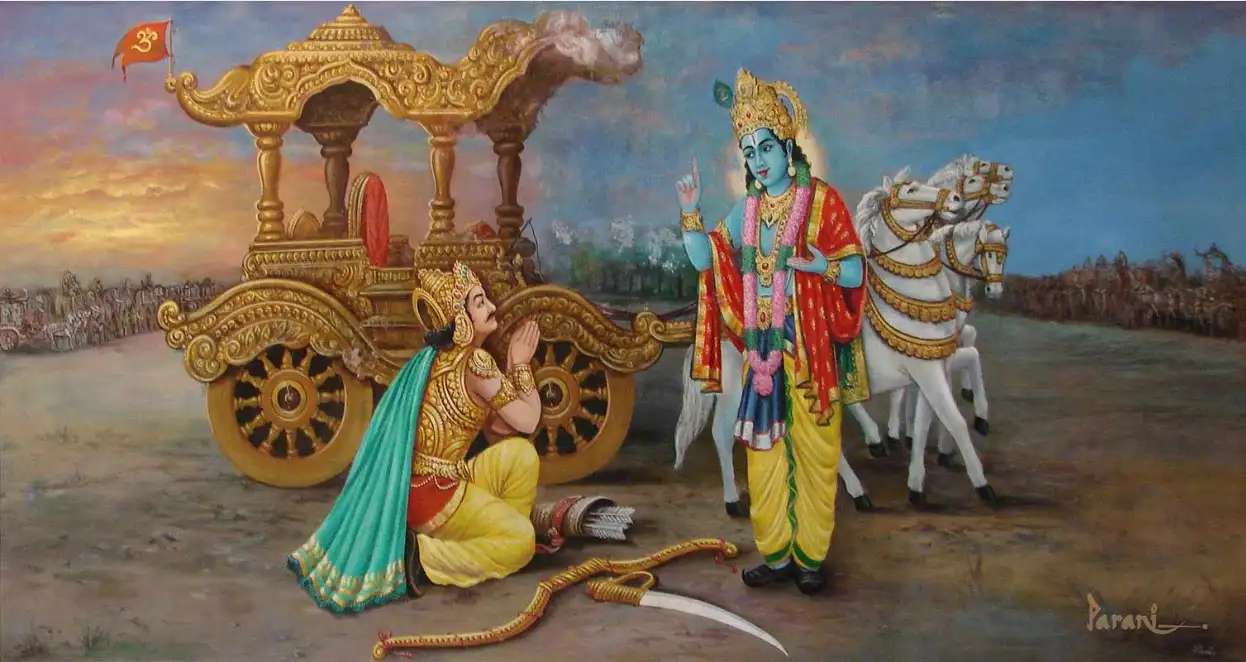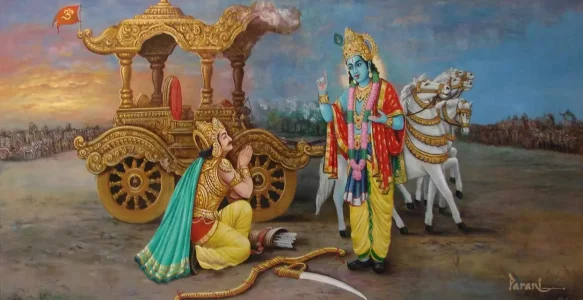Samantha Sawhney
While at first glance, The Bhagavad Gita seems to lack commonalities with the Dutch Judeo-Christian theology of Søren Kierkegaard, upon a deeper inspection there is a profound resonance between it and the post-Vedic Indian Classic, The Bhagavad Gita and Fear and Trembling. Though they come from the differing schools of Eastern and Western thought, they share intellectual and philosophical similarity.
The Gita is likely to have multiple authors, but it is traditionally ascribed to the authorship of the semi-mystical guru Vyasa. The work is a dialogue between Krishna and Arjuna originating as a portion of the Mahabharata, one of the largest post Vedic Hindu epics following several incarnations of Vishnu and their lives (Britannica). In the text, Krishna lays out the theological underpinnings of contemporary Hinduism through varna (वर्ण), dharma (धर्म), and devotional service. Arjuna is told to slay his brethren, the Pandus in a dispute over a kingdom that is rightfully his and has been taken from him. His duty as a soldier surpasses his individual desires as a man. Many concepts are discussed, including the relationship between labor and its fruits.
Fear and Trembling is an exploration of Genesis 22 and its ramifications to the faith life of a Christian. Kierkegaard wrote under the pseudonym of “Johannes de Silentio” in 1843. He focused on the sacrifice of Isaac as an incident indicative of Christianity’s fundamental demand: faith. To Kierkegaard, faith surpassed both reason and conventional Western morality.
Duty is one of the common threads shared by both of the aforementioned texts. In the moments before the battle begins, Krishna responds to Arjuna’s hesitation,
“Considering your specific duty as a Kshatriya, you should know that there is no better engagement for you than fighting on religious principles; and there is no need for hesitation. O Partha, happy are the Kshatriyas to whom such fighting opportunities come unsought.” (Bhagavad Gita.2.30-31).
There is no ambiguity in the statement of Krishna; a Kshatriya (क्षत्रिय) is understood to have an immediate duty to execute his dharma to the best of his mortal abilities. His war, as outlined by the Mahabharata, is a moral triumph of good over evil. Kierkegaard’s discussion of Abraham places him in a similar role of significance to Arjuna. In a covenant with Yaweh, he is supposed to follow the demands the divinity places upon him, regardless of what is demanded of him. He articulates the suspension of the ethical in this manner,
“The difference between the tragic hero and Abraham is clearly evident. The tragic hero still remains within the ethical […] Here there can be no question of a teleological suspension of the ethical itself. With Abraham the situation was different. By his act he overstepped the ethical entirely and possessed a higher telos outside of it.” (Kierkegaard 28).
By placing Abraham as suspending the ethical in responding to the will of God, Kierkegaard’s sentiment resonates heavily with that of Bhagavad Gita. The will of a divinity triumphs over man’s conception of morality, because a god overcomes man’s flawed assertion of right and wrong. The sacrifice of Isaac is one of the most profoundly disturbing incidents within the Torah for modern readers as is Arjuna’s familial fighting in the Bhagavad Gita; the concept of violence paired with the intimacy of family, shows human frailty in which disputes and the perception of divinity can sever domestic ties.
The greatest contrast lies in the conclusion drawn from the respective incidents. While Arjuna is forced to forsake all conceptions of morality except those given to him by Krishna, Kierkegaard’s interpretation of Genesis does not completely disregard morality. On the contrary, he placed the will of God outside of morality.
To conclude, one of the resonances between Kierkegaard’s reading of the sacrifice of Isaac in the book of Genesis and Krishna’s monologue to Arjuna in the Bhagavad Gita is found in the separation of divine mandate from morality wherein the will of the divine overrides an individually-derived sense of societal ethics. This shows a compelling ideological overlap between two vastly different religious thoughts from vastly different eras. The aforementioned resonance can be interpreted as one of many intellectual overlaps between post Vedic Hindu thought and Christian theology.
Works Cited
Doniger, Wendy. “Bhagavad Gita.” Encyclopedia Britannica, 25 Aug. 2022, https://www.britannica.com/topic/Bhagavadgita. Accessed 29 September 2022.
Kierkegaard, Søren. Fear and Trembling by Johannes de Silentio, 1843. Translated by Walter Lowrie, e-book ed., 1999.Swami Prabhupā, A.C Bhaktivedanta, translator. Bhagavad Gītā as It Is. Bhaktivedanta Book Trust, 1972.



A well-written, carefully researched, and clearly stated discussion that draws similarities of thought between what would seem to be vastly different religious viewpoints. Congratulations, Samantha!